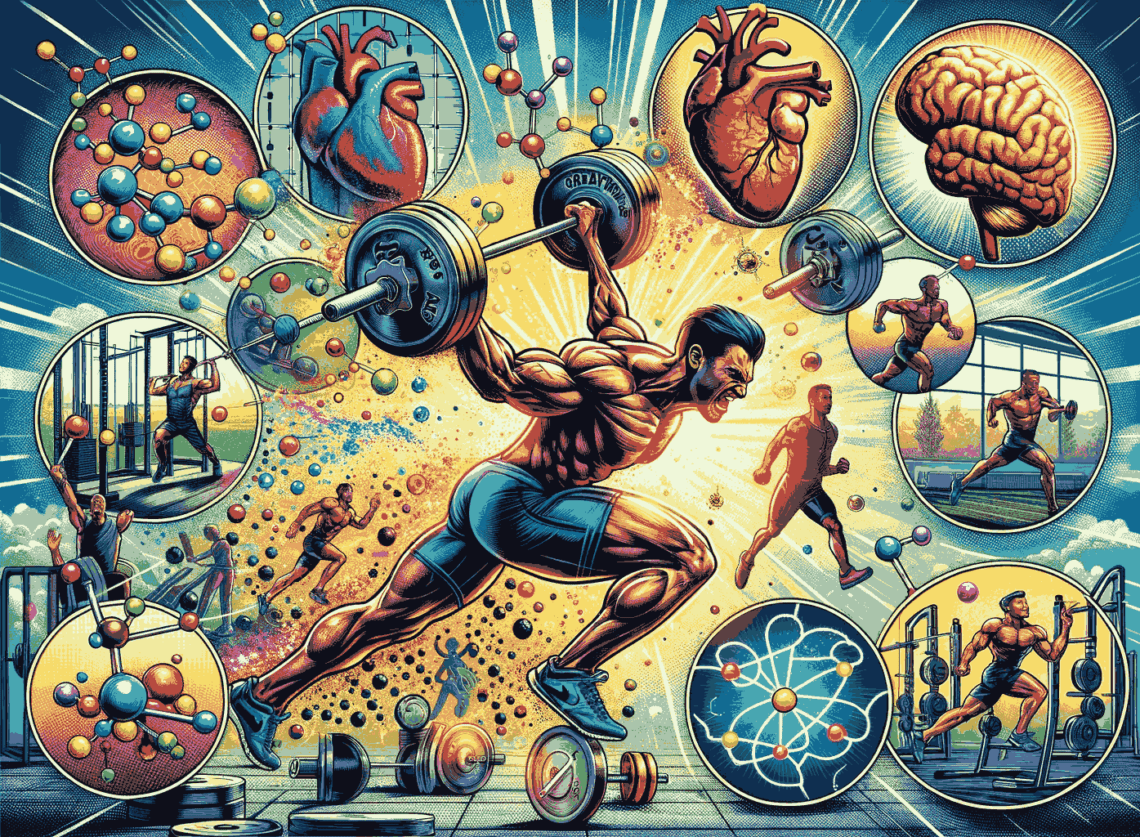Introduction: The Rising Star of Sports Nutrition
Creatine holds a special place in the realm of sports nutrition, esteemed as one of the most popular and effective supplements among athletes and fitness enthusiasts. Its popularity stems from its impressive ability to enhance athletic performance and overall physical health. This article aims to provide a detailed exploration of creatine: its definition, role in the human body, various forms, and approaches to selecting and utilizing creatine for maximum benefits.
Understanding Creatine
Creatine is a nitrogen-containing organic acid vital for energy metabolism in cells, especially muscle cells. Chemically, it comprises amino acids arginine, glycine, and methionine, and is naturally produced in the human liver and kidneys. Creatine is adept at rapidly generating ATP (adenosine triphosphate), the primary energy source for muscle contractions and other cellular functions.
Creatine’s Historical Usage
Interest in creatine as a sports supplement surged in the early 20th century when athletes began using it to enhance their performance. Since then, creatine has garnered significant attention from the scientific community, with numerous studies confirming its benefits in improving physical performance, increasing muscle mass and strength, and overall health and wellbeing.
Creatine in Modern Sports
In contemporary sports, creatine remains one of the most frequently used supplements due to its ability to enhance short-term, high-intensity performance. This makes it particularly beneficial in sports such as weightlifting, sprinting, and other activities requiring explosive power and rapid muscle contractions.
What is Creatine and How Does it Work?
Creatine is a natural substance that transforms into creatine phosphate in the body. It replenishes ATP, necessary for energy during high-intensity training. This aids in enhancing strength, endurance, and accelerating recovery.
Is Creatine Safe for Long-Term Use?
Creatine is generally safe for most individuals when used in recommended doses. Long-term studies confirm its safety. However, consulting a doctor before starting is advised, especially if there are pre-existing health conditions.
Is a Loading Phase Necessary for Creatine Use?
A loading phase can speed up muscle creatine saturation but isn’t mandatory. Many athletes skip this and use standard dosages, achieving similar results over a longer period.
Side Effects of Creatine Consumption
Creatine is usually well-tolerated, but in some cases, it can cause minor side effects like weight gain, stomach upset, or cramps. The weight gain is often related to fluid retention initially.
Creatine’s Impact on Kidneys
With moderate use and no pre-existing kidney diseases, creatine shouldn’t negatively affect the kidneys. Maintaining adequate hydration and following recommended dosages are important.
Can Creatine Help in Muscle Mass Gain?
Yes, creatine can aid in increasing muscle mass by improving strength performance and facilitating more intense, productive workouts.
Combining Creatine with Other Supplements
Creatine combines well with most sports supplements, including protein, BCAA, carbohydrates, and pre-workout complexes. It’s important to ensure the total supplement intake doesn’t exceed recommended doses.
Enhancing Physical Performance
Creatine significantly impacts physical performance, especially in disciplines requiring short energy bursts. It increases ATP production, crucial during short, intense exercises like sprinting or weightlifting. This energy boost helps athletes improve their performance, increasing the number and intensity of repetitions, and enhancing overall endurance and productivity.
Creatine’s Role in Muscle Mass Building
Creatine plays a key role in muscle mass development. It increases muscle cell volume through fluid retention and stimulates protein synthesis, essential for muscle growth. This makes creatine a popular choice among bodybuilders and athletes aiming to increase muscle mass and strength.
Creatine and Recovery
Creatine is also vital for post-workout recovery. It speeds up muscle recovery, reduces lactic acid levels, and lessens muscle damage and soreness following intense exercises. This makes it an important component in training programs that involve frequent and intense physical activities.
Creatine and Cognitive Functions
Interestingly, creatine can also positively affect cognitive functions. Some studies have shown that it can enhance memory and information processing speed, particularly in individuals experiencing fatigue or sleep deprivation.
Creatine and Heart Health
Creatine may contribute to cardiovascular health by improving the overall energy balance of heart cells. This can be beneficial for individuals with heart diseases and in preventing cardiovascular issues.
Potential Therapeutic Applications of Creatine
Beyond sports nutrition, creatine is being explored as a potential treatment for various diseases, including neurodegenerative disorders (such as Parkinson’s disease and ALS), muscular dystrophies, and other conditions related to cellular energy imbalances.






